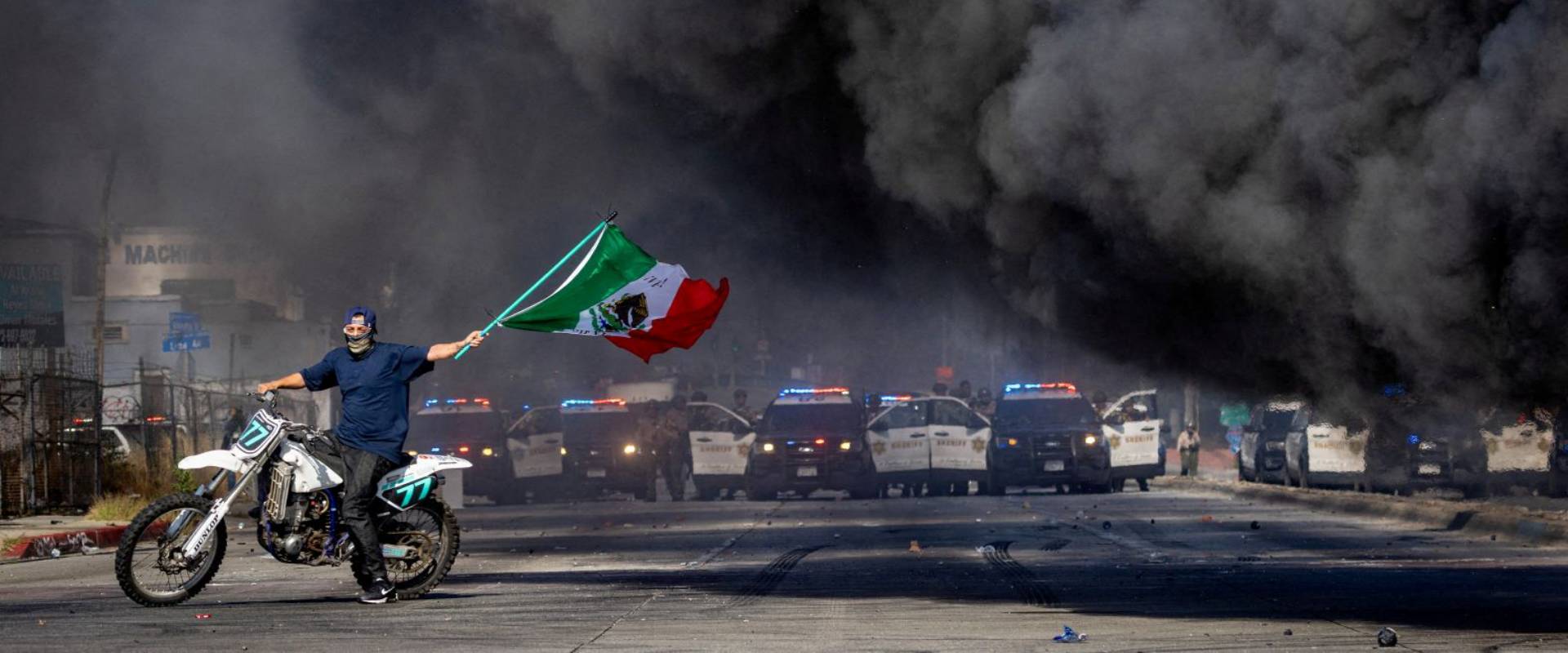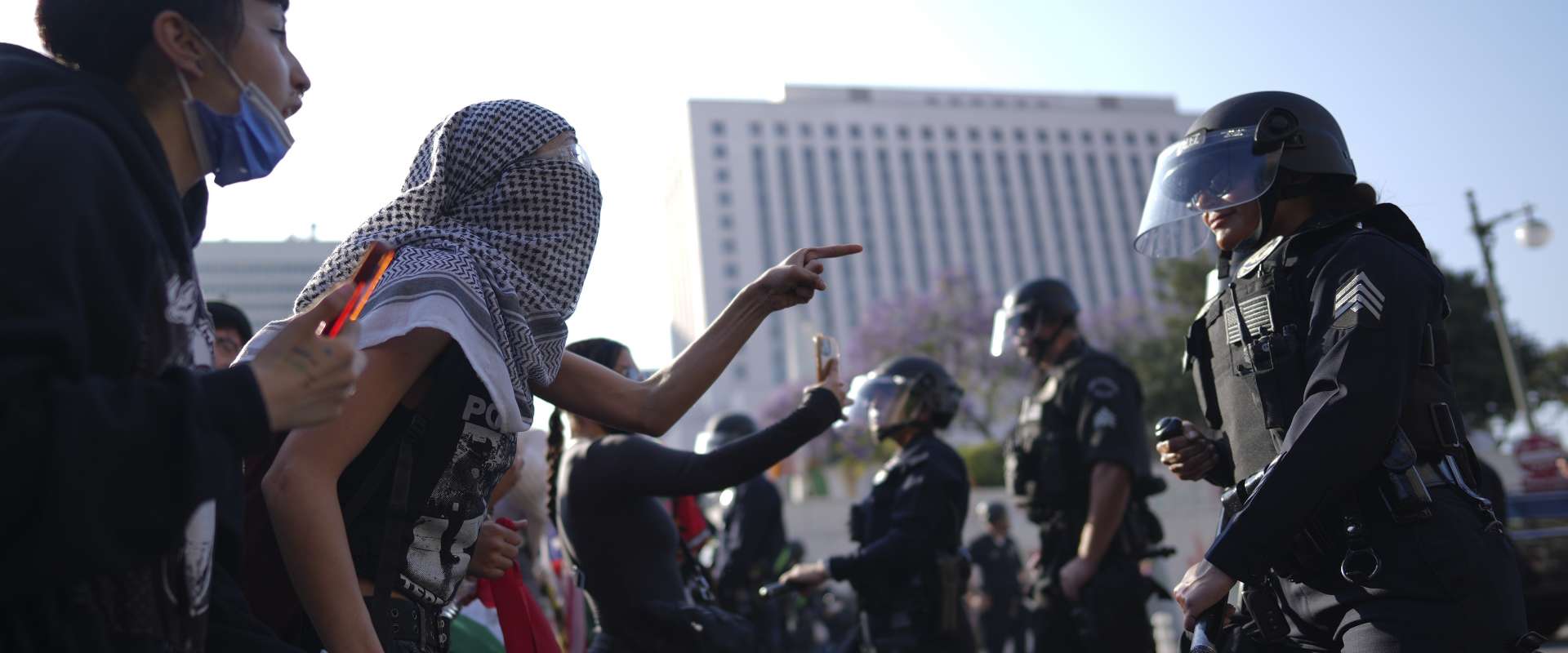What does the election say about current consciousness? Are a majority of Americans now MAGA racists?
People approach elections pragmatically. The majority decides how to vote on the basis of lesser-evilism. They estimate which candidate will be better for themselves and for society generally. They may or may not estimate this correctly based on information they have, and they do not necessarily embrace the political philosophy or program of the candidates.
In this election, the aftermath of Covid was decisive. Inflation has eaten into living standards since 2021. Small businesses and even some larger ones are under severe pressure. Workers’ wages overall continue to stagnate or decline. The wealth of the “booming” economy went only to the top.
Many ordinary Americans have nostalgia for a time of lower inflation under Trump. They have forgotten (or never realized) that higher inflation resulted from the pandemic-era economic collapse, and was further exacerbated by the aggressive profiteering of the capitalist class during this time. Many people mistakenly associate presidential administrations with economic conditions. Federal economic policies impact the economy, but do not fully determine them. This was a fundamental basis for the pro-Trump vote. Trump cynically and disingenuously exploited voters’ worries about the economy by making a campaign issue of grocery and gasoline prices — and the fact that Democrats ceded ground to him on that is one of many reasons for Harris’s loss.
Are Trump voters all MAGA racists? No. A core of petty-bourgeois Trump supporters are full MAGA — racist, sexist, anti-immigrant, anti-LGBTQ+ and so on. However, Trump continued to have a negative approval rating even among many who voted for him. Trump’s core support never broke 50 percent. It’s apparent that many Trump voters among the working class are more passive, going along with Trump out of confusion, nihilism, or despair.
Are Trump voters all MAGA racists? No. A core of petty-bourgeois Trump supporters are full MAGA — racist, sexist, anti-immigrant, anti-LGBTQ+. However, Trump continued to have a negative approval rating even among many who voted for him.
This doesn’t mean the situation isn’t appalling. Ordinary people who voted for Trump were fine with his bigotry and extreme nationalism. It was not a deal-breaker for them — just as genocide was not a deal-breaker for Harris supporters.
Trump represents an entrenchment of reactionary values in the mainstream. The hateful values of MAGA are sure to get a boost from Trump’s second election. The forces of MAGA will be consolidated and legitimized with Trump in the White House for a second term. This is without question a bad situation.
Who voted in the election?
As with all recent US elections, only somewhat more than a majority of the voting-age population voted. It’s important to remember that those who vote are more affluent than the overall population. Most people who abstain from voting are poor. Additionally, most felons and non-citizen immigrants cannot vote.
But in this election, fewer voted than last time. The total number of voters was down by some 14 million from 2020. While a slew of new restrictions after 2020 made voting, especially by mail, even more difficult, most of this decline in turnout was because of voters abandoning the Democrats. In 2020, Biden got 81 million votes. By comparison, as of this writing, Harris got just over 70 million votes — a big decline in support, especially in blue states.
Trump got roughly the same number of votes in 2024 as he got in 2020 — about 74 million. While it’s heartening that Trump hasn’t greatly increased his support, this does show the entrenchment and organizing power of Trump and his MAGA movement.
In every state where abortion rights-initiatives were on the ballot, they won a higher vote than the Harris campaign. If people voted for abortion rights, why didn’t they vote for the candidate who said she favored them?
Much is made by pundits of working-class Trump supporters and the “non-college educated” white voters. However, “non-college educated whites” includes many middle-class as well as working-class voters. Trump’s voting base in previous elections, and likely in this one as well, is the petty bourgeoisie or the middle class (small employers, managers, cops, independent professionals). This was shown by the occupations of the January 6 rioters.
Of course there are also millions of working-class Trump voters, but Trump voters are not a majority of the working class. In fact, in 2024 a larger percentage of union workers voted Democrat than in 2020.
Liberal elitists are quick to inaccurately blame workers for Trump’s victory. They assume that working-class and poor Trump voters are “voting against their own interests.” While this is true, it’s more to the point that neither party represents the interests of workers and the poor. Both parties support militarism, ecological destruction, profit over people, and a host of other social ills.
Where did voters stand on the issues?
At the state level, abortion-rights initiatives continued their streak of victories since the Dobbs decision. Five of the seven abortion-rights measures won majority support, even in Missouri, Arizona and Florida, states that went to Trump. In Florida the initiative failed because it needed 60 percent to win and just fell short at 57 percent.
Notably, in every state where abortion rights-initiatives were on the ballot, they won a higher vote than Harris. Why this discrepancy? Harris made a major point of calling for the reinstitution of Roe v. Wade — for abortion rights until viability. If people voted for abortion rights, why didn’t they vote for the candidate who said she favored them?
This is a common pattern on every issue. If everyone who voted on the left or progressive side of state or local initiatives also voted Democrat nationwide, there would be a resounding blue wave. The simple answer is that people don’t trust politicians in general and the Democrats in particular, and for good reason.
Democrats have claimed to be pro-choice since 1973. In those 50 years they have had numerous opportunities to enshrine abortion rights in federal law — at several points they have held the White House with a supermajority in Congress and could have passed any legislation they wanted. They have chosen not to do this, in part because campaigning on Roe is a major source of fundraising and publicity for the party.
In light of this, Harris’s claims that she would protect Roe now rang hollow. In considering whether to vote for a candidate, people consider their whole record, not just their stance on one initiative. Voters are increasingly aware that the Democrats have held Roe hostage for electoral purposes.
There are millions of working-class Trump voters, but Trump voters are not a majority of the working class. Liberal elitists are quick to inaccurately blame workers for Trump’s victory.
The success of abortion initiatives also shows that sexism was not the only reason Harris lost votes compared to Biden, as many liberals are claiming. A majority of Americans — 63% according to a recent Pew Research poll — support abortion rights, a fundamental pillar of women’s rights, and the success of abortion on the ballot is testament to this. From this we can extrapolate that most voters do support women’s rights.
However it would be foolish to deny that sexism played no part in the election. The sexist (and racist) attacks on Harris from the right were truly vile. In general, the reactionary backlash against feminism represented by figures like Trump, Joe Rogan, Johnny Depp, and Andrew Tate, and the toxic “manosphere” on social media encouraged by right-wing capitalists like Elon Musk, have created a very dangerous landscape for women. Four more years of Trump in the White House is likely to worsen this.
But it remains true that Democratic candidates, including women, are unpopular for a host of other reasons besides sexism.
On immigration, the picture is different. The Republicans and Democrats have both relentlessly promoted bigotry against immigrants. In fact in this election the Democrats ran to the right of Republicans on immigration (something that is not easy to do), championing a reactionary anti-amnesty bill that almost passed Congress last February. In the face of this barrage, public opinion has shifted in the wrong direction, though there is still significant support for immigrant rights.
On the genocide in Gaza, the majority of voters who support an arms embargo had little choice between Trump and Harris. Harris’s support of genocide cost her votes, especially among Palestinians, Muslims, and Arabs; but also more broadly in blue states where progressives didn’t have to fear that a protest vote might hand Trump the election. Though mass opposition to the genocide is just one of many factors that caused the Democrats’ dropoff in support, it shouldn’t be downplayed either. Some observers have maintained that support for a ceasefire might have helped Harris win, especially in swing states where a few thousand votes matter.
Either way, Gaza will be the issue that defines the 2024 election. The fact that both major-party candidates on the ballot supported genocide represents a terrible moral and political degradation that will have consequences for years to come.
Could Democrats have won if they ran further left?
Left-liberals and democratic socialists always urge the Democrats to put forward more left-wing platforms. They do this because they want the Democrats to win, and they believe that leftist values will help them do so. In this way, they reduce themselves to advisors to a fundamentally capitalist and imperialist party — attempting to rehabilitate a party that serves capital, not workers.
But would this even work? Harris embraced militarism and national security — “I will ensure America always has the strongest, most lethal fighting force in the world,” as she infamously stated at the Democratic National Convention in July. She won support from Pentagon generals, and from the notorious Bush-era war criminal Dick Cheney and his family. Most damningly she consistently and staunchly supported the genocide in Gaza.
Trump did not win this race. Instead the Democrats lost it. They lost millions of votes after four years of broken promises, union busting, inflation, austerity, unchecked deaths from covid, attacks on protesters, and genocide. All the celebrities, memes, Republican endorsements, and a billion dollars could not overcome the pain and outrage people felt under Biden’s rule.
Yet Harris also threw in liberal proposals — a child tax credit, home buyer assistance, an attack on price-gouging, and more. So, she moved rightward, but with some liberal flourishes.
Her problem, as noted above, is that few believed she was sincere about any of it. Politicians lie to get elected, and people know that. They look at results, not just rhetoric. The Democrats have embraced neoliberalism and austerity for nearly 50 years, and people know that in their guts, if not consciously. As mentioned, people might vote for liberal or left-wing initiatives, but they don’t necessarily believe politicians who talk them up at election time.
As shown by the lower turnout, Trump did not win this race. Instead the Democrats lost it. They lost millions of votes after four years of Democratic Party rule — four years of broken promises, union busting, inflation, austerity, unchecked deaths from covid, attacks on protesters, and genocide. All the celebrities, memes, slick media appearances, Republican endorsements, and a billion dollars could not overcome the pain and outrage people felt under Biden’s rule.
Even an independent labor party would face a challenge similar to what the Democrats now face. A labor party with a pro-worker platform would have to prove itself in practice to win support. In the past, labor parties have been co-opted by capitalism, moderated their politics, and lost support.
Does this election change how Marxists see the goal of working-class self-emancipation?
In a word, no. Marxists see the working class as the class that can transform capitalism into socialism through a revolution. In a revolutionary crisis, workers can take control of the economy and reorganize it to meet human needs. In order to do that, workers will need a transformation in consciousness. They will need to reject capitalist politics and embrace the goal of overthrowing capitalism.
This transformation of consciousness is caused when the horrors of capitalism and the struggle against it by workers and the oppressed become more acute. No one can predict when a social, economic, or political crisis will force this transformation. When that time comes, revolutionary working-class organization will be essential to make the revolution successful. In the meantime, working-class struggle can increase anti-capitalist consciousness a little at a time.
This goal does not make Marxists blind to the current consciousness of workers! As Marx and Engels wrote, “The ruling ideas of any age are the ideas of the ruling class.” Short of a revolutionary situation, the consciousness of the majority of workers is mixed. It contains ruling ideas mixed with ideas of struggle against exploitation and oppression.
Trump’s second presidency will sharpen the contradictions within the ruling class as well as between the ruling class, the state, and ordinary people. This will give revolutionaries more opportunities to organize. We need to seize those opportunities and not be discouraged by Trump’s accession to office.
Marxists need to make an accurate assessment of the consciousness of particular groups of workers. This is necessary in order to frame exactly how to increase the level of struggle, which in turn furthers development of consciousness. It does Marxists no good to be inaccurately optimistic or pessimistic about current consciousness, or to downplay the prevalence of racism, sexism, and other forms of bigotry.
The existence of reactionary ideas among groups of workers does not in any way invalidate the goal of working-class self-emancipation. The prevalence of oppressive ideas such as racism, sexism, immigrant-bashing, and transphobia today does not prevent the ultimate goal of socialist revolution — though of course those ideas disrupt solidarity and hold the struggle back. A key role of Marxists is to fight against oppressive ideas as well as institutional oppression.
In 1917, workers in Russia overthrew the 1000-year monarchy, took power, and began the transition to socialism. Yet just 12 years earlier, in 1905, they had religious processions appealing to the tsar, and some engaged in pogroms against Jews. Consciousness can change rapidly, but can best be sustained through organization.
Marxists need to understand that in most periods, we will be a small minority. Transformation of consciousness is necessary for the transformation of the economy and society; and fundamental transformation of consciousness comes only in revolution. We build toward that transformation by promoting struggle and revolutionary organization among a minority today. As Rosa Luxemburg said, “There is no real victory but the final one.”
There will need to be tactical changes based on political conditions, but this fundamental strategy remains the same no matter who is in the White House, Congress, or the Supreme Court.
Today, our more immediate tasks must be to provide a guide for understanding, action, and defense to wider layers of people. However they voted or abstained, many were shocked by the election results. Already the liberal establishment’s false narrative of a “Red Wave” is spreading paralyzing fear and hopelessness among some. We must empathize with this despair, while at the same time cutting against it.
Besides offering analysis about the long-term implications, revolutionaries need to prepare the ground now to organize a broad defense of our communities and movements. This mass defense will have to include movement radicals, those who abstained, and even many of those who, no matter how shamefully, held their noses and voted for one genocidal party or another. Only by organizing, and not at all allying with the liberal establishment, which utterly failed to stop Trumpism over the past four years, can we combat the right wing and advance our class.
Trump’s second presidency will present new challenges, sharpening the contradictions within the ruling class as well as between that class, the state, and ordinary people. This will give revolutionaries more opportunities to organize. We need to seize those opportunities and not be discouraged by Trump’s accession to office.



